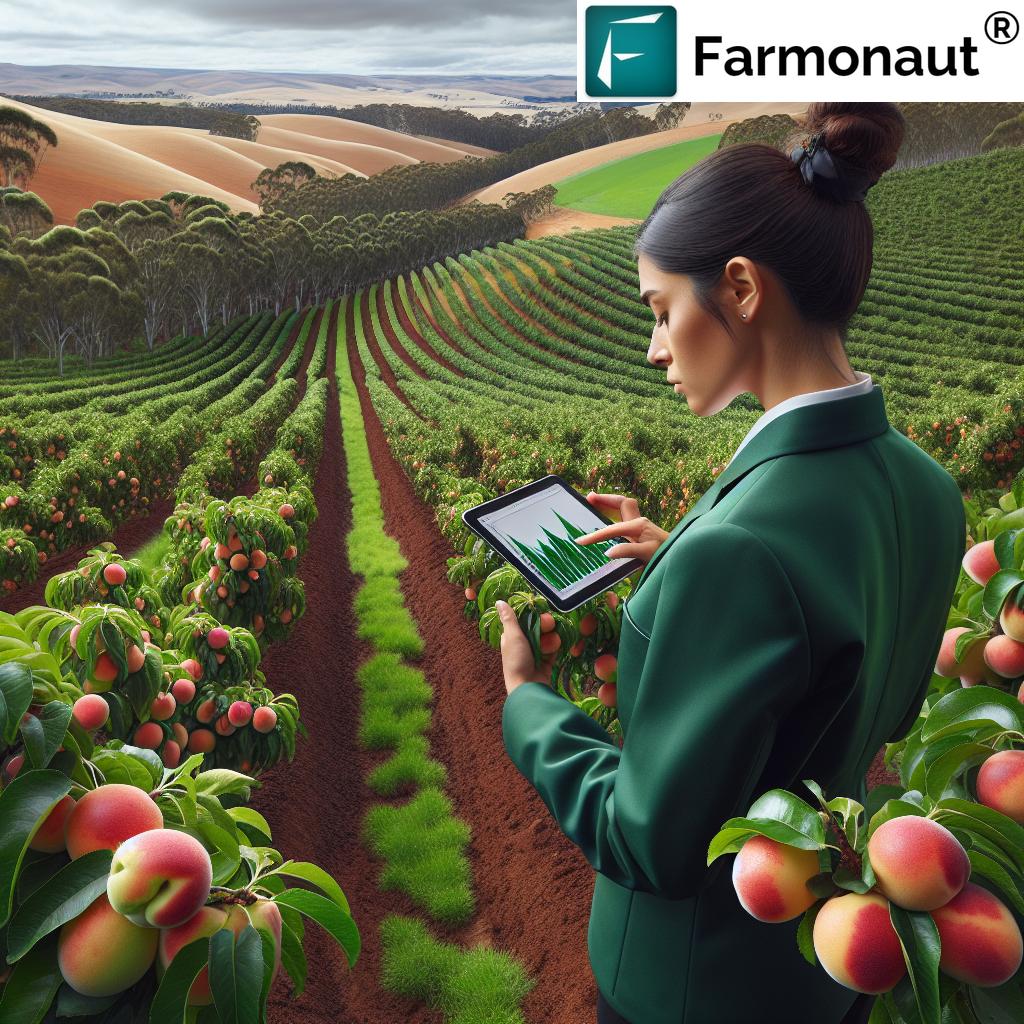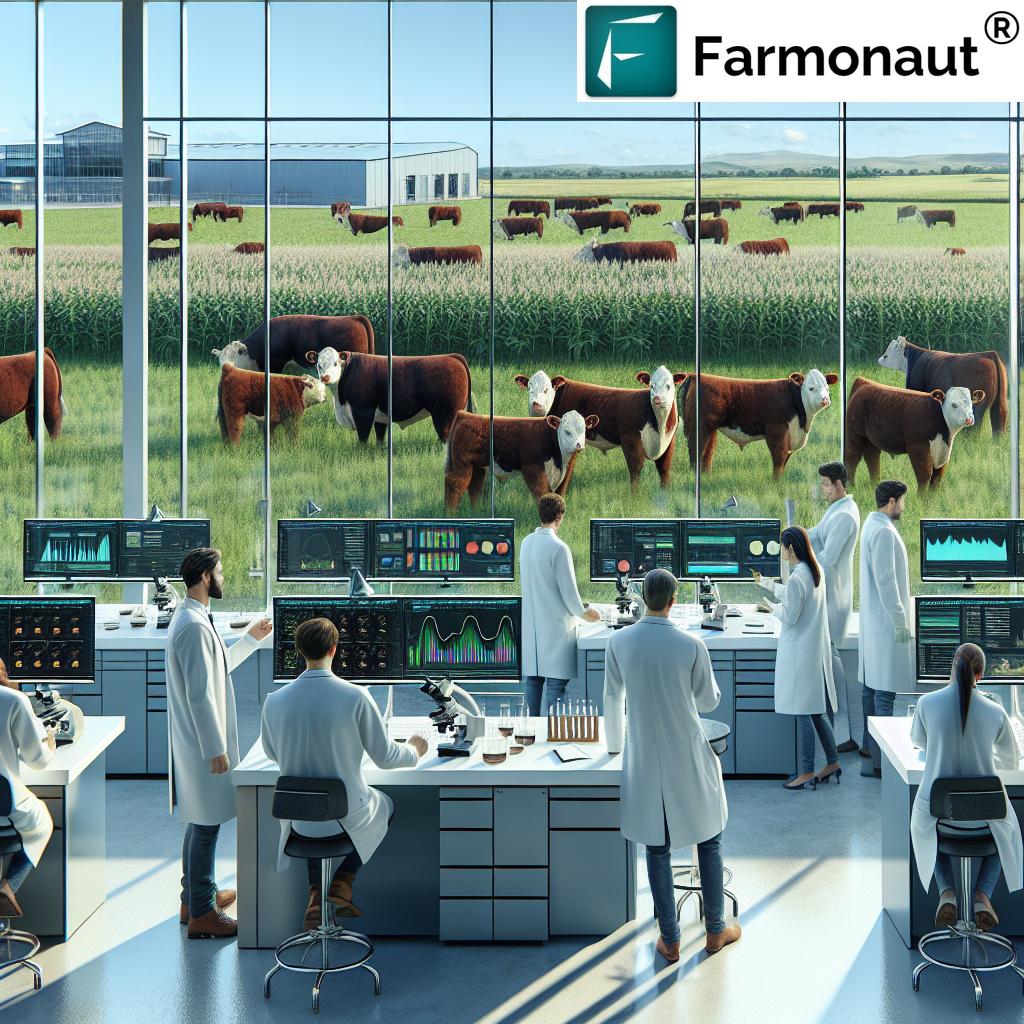Unlock Your Farming Potential: Smart Agriculture Diploma Courses in Western Australia’s Southwest
“Western Australia’s Southwest offers over 10 smart agriculture diploma courses focusing on innovative orchard management techniques.”

Welcome to the exciting world of smart farming in Western Australia’s Southwest! We’re thrilled to take you on a journey through the orchards and fields of this beautiful region, where agricultural innovation is flourishing. In this comprehensive guide, we’ll explore how agricultural training courses and horticulture diploma programs are shaping the future of farming, equipping students with cutting-edge skills and knowledge to thrive in the ever-evolving agricultural landscape.
As we delve into the world of smart farming techniques, we’ll uncover the secrets of successful farming operations and show you how you can be part of the next generation of skilled agricultural professionals. Whether you’re a budding farmer, an experienced grower looking to upskill, or simply curious about the latest advancements in agriculture, this blog post is your gateway to unlocking your farming potential.
The Rise of Smart Agriculture in Western Australia
Western Australia’s Southwest has long been known for its fertile lands and diverse agricultural production. From sprawling cattle farms to lush orchards bursting with stonefruit and pome fruits, this region is a testament to the rich farming heritage of Australia. However, in recent years, we’ve witnessed a remarkable transformation as traditional farming practices merge with cutting-edge technology and data-driven decision-making.
This evolution has given rise to smart agriculture – a approach that leverages technology, data analytics, and precision farming techniques to optimize crop yields, reduce resource consumption, and minimize environmental impact. As a result, the demand for skilled professionals who can navigate this new agricultural landscape has skyrocketed, leading to the development of specialized diploma courses and training programs.
Smart Agriculture Diploma Courses: Your Gateway to the Future of Farming
In response to the growing need for tech-savvy agricultural professionals, several institutions in Western Australia’s Southwest have developed comprehensive diploma programs that blend traditional agricultural knowledge with modern farming technologies. These courses are designed to equip students with a diverse skill set, covering everything from soil science and crop management to precision agriculture and agribusiness management.
Let’s take a closer look at some of the key areas covered in these innovative diploma courses:
- Soil Testing and Agronomy: Students learn advanced techniques for analyzing soil health, nutrient content, and water retention capabilities. This knowledge is crucial for optimizing crop growth and implementing sustainable farming practices.
- Precision Agriculture Practices: Courses introduce students to cutting-edge technologies such as GPS-guided machinery, drone mapping, and satellite imagery analysis. These tools enable farmers to make data-driven decisions about planting, irrigation, and harvesting.
- Orchard Management Skills: With a focus on the region’s thriving fruit industry, programs offer specialized training in orchard layout, pruning techniques, and integrated pest management for stonefruit and pome fruit production.
- Sustainable Fruit Production: Students learn how to balance productivity with environmental stewardship, exploring organic farming methods, water conservation strategies, and biodiversity preservation techniques.
- Agricultural Technology Solutions: Courses cover the latest advancements in farm management software, IoT sensors, and automated systems that are revolutionizing modern agriculture.
Hands-On Learning: The Cornerstone of Agricultural Education
“Students in agricultural training programs spend up to 50% of their time on hands-on learning in orchards and farms.”
One of the most exciting aspects of these diploma programs is the emphasis on practical, hands-on learning. We believe that the best way to master agricultural skills is through direct experience, which is why students spend a significant portion of their time working in real farm environments.
From pruning fruit trees in local orchards to operating state-of-the-art precision farming equipment, students gain invaluable experience that prepares them for the realities of modern farming. This practical approach not only reinforces theoretical knowledge but also helps students develop problem-solving skills and adapt to the ever-changing conditions of agricultural work.

Embracing Technology in Agricultural Education
As we move further into the digital age, agricultural education is keeping pace by incorporating cutting-edge technologies into the curriculum. One such technology that’s making waves in the farming world is satellite-based crop monitoring. To give you a better understanding of how this technology is used in modern farming, let’s take a look at a tutorial from Farmonaut, a leading provider of agricultural technology solutions:
As you can see, interpreting satellite data is becoming an essential skill for modern farmers. Many diploma courses now include modules on remote sensing and satellite imagery analysis, ensuring that graduates are well-equipped to leverage these powerful tools in their future careers.
Crop Management Strategies for the 21st Century
One of the key focus areas in smart agriculture diploma courses is the development of advanced crop management strategies. These strategies combine traditional agricultural wisdom with data-driven insights to optimize every aspect of crop production. Let’s explore some of the innovative approaches that students learn:
- Precision Nutrient Management: Using soil testing results and crop health data, students learn to create tailored fertilization plans that maximize yields while minimizing waste and environmental impact.
- Integrated Pest Management (IPM): Courses cover modern IPM techniques that use a combination of biological controls, targeted pesticide applications, and cultural practices to manage pests effectively and sustainably.
- Water-Efficient Irrigation: Students explore advanced irrigation systems and scheduling techniques that optimize water usage based on real-time soil moisture data and weather forecasts.
- Climate-Smart Agriculture: With a focus on adapting to changing climate conditions, courses teach strategies for building resilience into farming systems, such as drought-tolerant crop selection and microclimate management.
By mastering these strategies, graduates of smart agriculture diploma programs are well-prepared to tackle the complex challenges facing modern farmers and contribute to more sustainable and productive agricultural practices.
The Role of Technology in Modern Farm Management
As we’ve seen, technology plays a crucial role in smart agriculture. To give you a better idea of how farmers are using these tools in their daily operations, let’s take a look at another tutorial from Farmonaut, this time focusing on farm mapping using smartphone apps:
This video demonstrates how easy it has become for farmers to map and monitor their fields using nothing more than a smartphone. Many agricultural diploma courses now include training on these types of mobile applications, ensuring that graduates are comfortable with the latest farm management technologies.
Speaking of technology, if you’re interested in exploring these tools yourself, you might want to check out Farmonaut’s offerings:

For mobile users:


Agribusiness Career Opportunities in Western Australia
One of the most exciting aspects of pursuing a smart agriculture diploma is the wide range of agribusiness career opportunities that become available to graduates. The skills and knowledge gained through these programs are highly valued in various sectors of the agricultural industry. Let’s explore some of the potential career paths:
- Farm Manager: Oversee the day-to-day operations of large-scale farms or orchards, implementing smart farming techniques to optimize production.
- Precision Agriculture Specialist: Work with farmers to implement and manage precision farming technologies, analyzing data to improve crop yields and resource efficiency.
- Agronomist: Provide expert advice on crop production, soil management, and pest control, using advanced testing and monitoring techniques.
- Agricultural Technology Consultant: Help farmers and agribusinesses integrate new technologies into their operations, improving efficiency and productivity.
- Sustainable Agriculture Coordinator: Develop and implement sustainable farming practices, working with farms to reduce environmental impact while maintaining profitability.
- Orchard Manager: Specialize in the management of fruit orchards, applying advanced techniques in pruning, irrigation, and harvest management.
- Agricultural Data Analyst: Analyze farm data to provide insights and recommendations for improved decision-making and resource allocation.
These are just a few examples of the exciting career paths available to graduates of smart agriculture diploma programs. The skills gained through these courses are also highly transferable, opening up opportunities in related fields such as environmental management, food production, and agricultural research.
Comparing Smart Agriculture Diploma Courses
To help you make an informed decision about your agricultural education, we’ve compiled a comparison table of smart agriculture diploma courses offered in Western Australia’s Southwest. This table provides an overview of key features and focus areas for each program:
| Course Name | Institution | Duration | Key Focus Areas | Practical Components | Technology Integration | Career Opportunities | Industry Partnerships |
|---|---|---|---|---|---|---|---|
| Advanced Diploma in Smart Agriculture | Western Australia Agricultural Institute | 2 years | Precision farming, Agronomy, Farm management | 600 hours of hands-on training | Drone mapping, GPS-guided machinery, IoT sensors | Farm manager, Precision ag specialist | Local farms, Agtech companies |
| Diploma in Sustainable Orchard Management | Southwest Horticulture College | 18 months | Fruit production, Integrated pest management, Sustainable practices | 400 hours in commercial orchards | Automated irrigation systems, Climate monitoring | Orchard manager, Fruit production consultant | Regional fruit growers association |
| Advanced Certificate in AgriTech | Digital Farming Institute of WA | 1 year | Data analytics, Remote sensing, Precision agriculture | 300 hours of tech-focused practical work | Satellite imagery analysis, AI-driven crop monitoring | Agtech consultant, Agricultural data analyst | Tech startups, Research institutions |
| Diploma in Regenerative Agriculture | Eco-Farming Academy | 2 years | Soil health, Biodiversity, Carbon sequestration | 500 hours on regenerative farms | Soil microbiome analysis, Carbon footprint tracking | Regenerative farm manager, Sustainability coordinator | Organic certification bodies, Environmental NGOs |
This comparison highlights the diverse range of options available to students interested in smart agriculture. Each program offers a unique blend of traditional agricultural knowledge and cutting-edge technology, preparing graduates for success in various aspects of modern farming.
The Global Impact of Smart Agriculture
As we explore the world of smart agriculture in Western Australia, it’s important to recognize the global impact of these innovative farming practices. Agricultural technology companies like Farmonaut are working to make precision agriculture accessible to farmers worldwide. Let’s take a look at an example of how this technology is being applied in different parts of the world:
This collaboration between Farmonaut and the STEI Foundation in Africa demonstrates how smart agriculture technologies can be adapted to different contexts, helping farmers in various regions improve their productivity and sustainability.
The Future of Farming: Integrating Technology and Traditional Knowledge
As we look to the future of agriculture, it’s clear that the integration of technology with traditional farming knowledge will be key to addressing global food security challenges. Smart agriculture diploma courses are at the forefront of this integration, preparing the next generation of farmers to leverage the best of both worlds.
Let’s take a closer look at how satellite data is transforming farming practices:
As you can see, the ability to interpret and apply satellite data is becoming an essential skill for modern farmers. Many smart agriculture diploma programs now include modules on remote sensing and data analysis, ensuring that graduates are well-prepared to use these powerful tools in their future careers.
Embracing a Sustainable Future in Agriculture
As we conclude our exploration of smart agriculture diploma courses in Western Australia’s Southwest, it’s clear that the future of farming is bright, innovative, and sustainable. These programs are not just teaching students how to farm; they’re equipping them with the skills and knowledge to become leaders in the agricultural revolution.
By combining hands-on experience with cutting-edge technology and a strong foundation in agricultural science, these courses are preparing graduates to tackle the complex challenges facing global agriculture. From improving crop yields and reducing environmental impact to ensuring food security for a growing population, the skills gained through these programs are more valuable than ever.
Whether you’re a young student looking to start your career in agriculture, an experienced farmer seeking to update your skills, or someone passionate about sustainable food production, smart agriculture diploma courses offer a pathway to an exciting and rewarding future in the field.
As we’ve seen throughout this blog post, the integration of technology in farming is no longer a futuristic concept – it’s happening right now, and it’s transforming the way we produce food. By embracing these innovations and combining them with time-tested agricultural practices, we can create a more sustainable, efficient, and productive farming sector.
We encourage you to explore the smart agriculture diploma options available in Western Australia’s Southwest and take the first step towards unlocking your farming potential. The future of agriculture is in your hands – are you ready to grow with it?
Frequently Asked Questions (FAQ)
- What are the entry requirements for smart agriculture diploma courses?
Entry requirements vary by institution but typically include completion of Year 12 or equivalent, with a focus on sciences and mathematics. Some programs may also consider relevant work experience. - How much does it cost to study a smart agriculture diploma in Western Australia?
Costs can vary widely depending on the institution and course duration. Many students are eligible for government subsidies or VET student loans. It’s best to check with individual institutions for the most up-to-date fee information. - Can international students enroll in these diploma programs?
Yes, many institutions welcome international students. However, additional requirements such as English language proficiency tests may apply. - Are there job placement opportunities after completing the diploma?
Many programs offer job placement assistance or have strong connections with local agricultural businesses. However, job placement is not guaranteed and may depend on individual performance and market conditions. - Can I specialize in a particular area of smart agriculture during my studies?
Most diploma programs offer elective units or specialization tracks that allow students to focus on areas of particular interest, such as precision agriculture, sustainable farming, or orchard management.
Explore Farmonaut’s Satellite-Based Farm Management Solutions
If you’re interested in experiencing the power of satellite-based farm management firsthand, consider exploring Farmonaut’s offerings:
For developers and businesses looking to integrate satellite and weather data into their own systems, check out Farmonaut’s API:
Ready to take your farming to the next level? Explore Farmonaut’s subscription options:
By leveraging these advanced tools and technologies, you’ll be well-equipped to apply the knowledge gained from your smart agriculture diploma courses in real-world farming scenarios.



